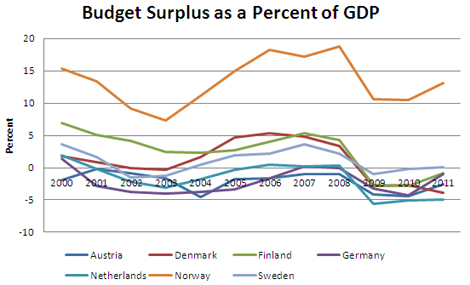May 18, 2012
David Brooks lectures us this morning on the need to have a balance between self-doubt and self-confidence.
“Western democratic systems were based on a balance between self-doubt and self-confidence. They worked because there were structures that protected the voters from themselves and the rulers from themselves. Once people lost a sense of their own weakness, the self-doubt went away and the chastening structures were overwhelmed.”
According to Brooks:
“In Europe, workers across the Continent want great lifestyles without long work hours. They want dynamic capitalism but also personal security. European welfare states go broke trying to deliver these impossibilities.”
The problem of course is that these are not impossibilities. Like the United States, Europe’s economies increase their productivity every year. Higher productivity growth means that people can enjoy higher living standards. There is absolutely nothing impossible about having dynamic capitalism along with security and shorter work hours. In fact, the latter is arguably the purpose of the former. In the European welfare states the economies were structured in a way that led more of the gains from this growth to be broadly shared as opposed to the United States, where the economy was structured to distribute most of the gains to those at the top.
And the European welfare states were not going broke. Until the crisis the most generous welfare states in northern Europe were either running budget surpluses or relatively small sustainable deficits. (Yes, these are surpluses — positive is larger.) Unlike the United States these countries also had trade surpluses or small deficits.

Source: International Monetary Fund.
In short, the underlying claim of Brooks’ eloquent homily on self-doubt and self-confidence is not true. If Brooks had a bit more self-doubt perhaps he would have bothered to look at the data or consult someone who knew the data before devoting valuable space on the NYT oped page to making a point that is not valid.







Comments